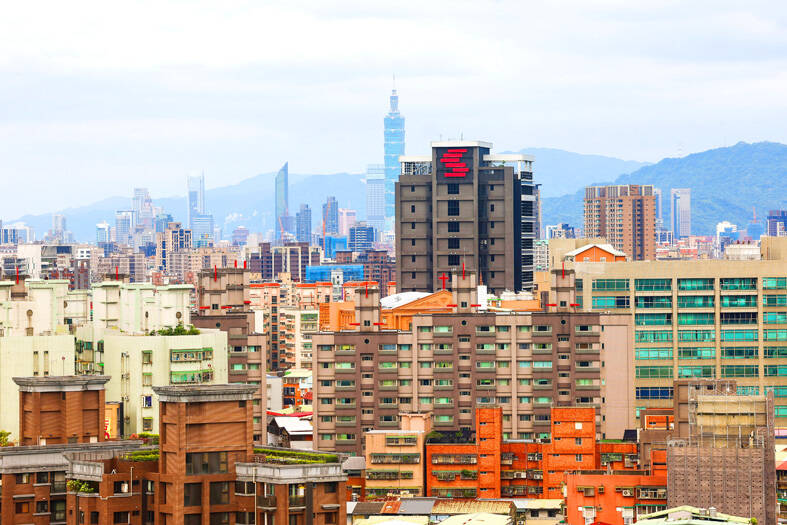Housing unaffordability in Taiwan worsened in the second quarter of this year, when the average price for a home climbed to 10.65 times the average household income and mortgages were 46.02 percent of income, data released on Oct. 25 by the Ministry of the Interior showed.
The latest government data confirmed that house prices grew more expensive across Taiwan, including in outlying counties, while mortgages constituted an increased share of household financial resources.
“The house price-to-income ratio was at a record high in five of the six special municipalities,” said Tseng Ching-der (曾進德), research manager at Sinyi Realty Inc (信義房屋), the nation’s only listed broker.

Photo: CNA
The ratio was less than 10-fold in Taoyuan, Tainan and Kaohsiung three months earlier, but only Taoyuan was below the level in the second quarter, Tseng said on Monday.
The ratio was highest in Taipei at 16.36-fold, followed by New Taipei City (13.71), Taichung (12.69), Kaohsiung (10.39) and Tainan (10.29), the data showed.
House prices in Taoyuan averaged 9.13 times household income, an increase of 0.23 from the preceding quarter, although it remained below the national average, the data showed.
Mortgage burdens in Taipei, New Taipei City and Taichung rose to 70.69 percent, 59.27 percent and 54.83 respectively, with people eager to own a home regardless of affordability, the data showed.
Favorable government lending terms featuring an ultra-low interest rate of 1.775 percent, a five-year grace period and mortgages of up to 40 years are believed to have encouraged people to join the market.
The ministry deems mortgage burdens of 30 percent as “reasonable,” burdens greater than 30 percent as “moderately low” and burdens of more than 40 percent as “very low.”
Mortgage burdens in Tainan, Kaohsiung and Hsinchu City, as well as Yilan, Changhua, Nantou and Hualien counties surpassed the 40 percent mark, while Taoyuan (39.48 percent), Miaoli County (38.52 percent) and Taichung (37.12 percent) were near the alert level, the data showed.
Affordability also proved a challenge in outlying counties, with mortgage burdens of 39.72 percent in Penghu County and 38.26 percent in Kinmen County, the data showed.
Only mortgage burdens in Keelung were at the “reasonable” level at 27.99 percent, while Pingtung, Yunlin and Chaiyi counties were all above 30 percent, the data showed.
The data likely prompted the central bank in September to extend nationwide loan restrictions for second homes that had previously been limited to the special six municipalities and Hsinchu.

Taiwan Semiconductor Manufacturing Co (TSMC, 台積電) would not produce its most advanced technologies in the US next year, Minister of Economic Affairs J.W. Kuo (郭智輝) said yesterday. Kuo made the comment during an appearance at the legislature, hours after the chipmaker announced that it would invest an additional US$100 billion to expand its manufacturing operations in the US. Asked by Taiwan People’s Party Legislator-at-large Chang Chi-kai (張啟楷) if TSMC would allow its most advanced technologies, the yet-to-be-released 2-nanometer and 1.6-nanometer processes, to go to the US in the near term, Kuo denied it. TSMC recently opened its first US factory, which produces 4-nanometer

GREAT SUCCESS: Republican Senator Todd Young expressed surprise at Trump’s comments and said he expects the administration to keep the program running US lawmakers who helped secure billions of dollars in subsidies for domestic semiconductor manufacturing rejected US President Donald Trump’s call to revoke the 2022 CHIPS and Science Act, signaling that any repeal effort in the US Congress would fall short. US Senate Minority Leader Chuck Schumer, who negotiated the law, on Wednesday said that Trump’s demand would fail, while a top Republican proponent, US Senator Todd Young, expressed surprise at the president’s comments and said he expects the administration to keep the program running. The CHIPS Act is “essential for America leading the world in tech, leading the world in AI [artificial

REACTIONS: While most analysts were positive about TSMC’s investment, one said the US expansion could disrupt the company’s supply-demand balance Taiwan Semiconductor Manufacturing Co’s (TSMC, 台積電) new US$100 billion investment in the US would exert a positive effect on the chipmaker’s revenue in the medium term on the back of booming artificial intelligence (AI) chip demand from US chip designers, an International Data Corp (IDC) analyst said yesterday. “This is good for TSMC in terms of business expansion, as its major clients for advanced chips are US chip designers,” IDC senior semiconductor research manager Galen Zeng (曾冠瑋) said by telephone yesterday. “Besides, those US companies all consider supply chain resilience a business imperative,” Zeng said. That meant local supply would

BIG INVESTMENT: Hon Hai is building the world’s largest assembly plant for servers based on Nvidia Corp’s state-of-the-art AI chips, Jalisco Governor Pablo Lemus said The construction of Hon Hai Precision Industry Co’s (鴻海精密) massive artificial intelligence (AI) server plant near Guadalajara, Mexico, would be completed in a year despite the threat of new tariffs from US President Donald Trump, Jalisco Governor Pablo Lemus said. Hon Hai, also known as Foxconn Technology Group (富士康科技集團), is investing about US$900 million in what would become the world’s largest assembly plant for servers based on Nvidia Corp’s state-of-the-art GB200 AI chips, Lemus said. The project consists of two phases: the expansion of an existing Hon Hai facility in the municipality of El Salto, and the construction of a